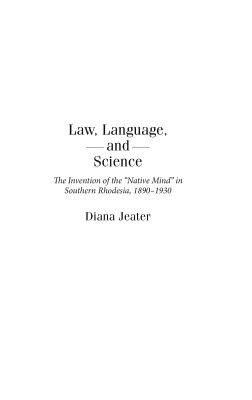
- We will send in 10–14 business days.
- Author: Diana Jeater
- Publisher: Praeger
- ISBN-10: 032507108X
- ISBN-13: 9780325071084
- Format: 16.5 x 23.5 x 2.7 cm, hardcover
- Language: English
- SAVE -10% with code: EXTRA
Reviews
Description
This book examines the mentalities of various communities within a district of Southern Rhodesia (Zimbabwe). Focusing in particular on white administrators and missionaries in the Melsetter District, it combines linguisitc/lexical analysis with historical interpretation, in an attempt to reconstruct what whites and Africans actually meant by the words and practices they used in interactions with each other. Jeater provides a detailed study of translation work in Mt Selinda, an evangelical mission; it also examines formal and informal court hearings, to contrast the perceptions and meanings ascribed to cases by white adjudicators and by African participants. This leads into an initial attempt to map out the birth of ethnography in Southern Rhodesia and to contrast it with anthropology in South Africa. By the 1920s, Africans' expertise in their own languages and culture had been usurped by self-referential white linguists and ethnographers. This account suggests that there is a tendency among archive-oriented historians to overestimate how far white missionaries and administrators really understood what Africans said and did. In addition to making a contribution to our empirical knowledge of Zimbabwe's history, the book focuses on how and why investigators first began to make claims to such knowledge. It urges those studying African history to be self-reflective about their practice, examining the historical roots of their claims to expertise. such claims
EXTRA 10 % discount with code: EXTRA
The promotion ends in 17d.08:41:24
The discount code is valid when purchasing from 10 €. Discounts do not stack.
- Author: Diana Jeater
- Publisher: Praeger
- ISBN-10: 032507108X
- ISBN-13: 9780325071084
- Format: 16.5 x 23.5 x 2.7 cm, hardcover
- Language: English English
This book examines the mentalities of various communities within a district of Southern Rhodesia (Zimbabwe). Focusing in particular on white administrators and missionaries in the Melsetter District, it combines linguisitc/lexical analysis with historical interpretation, in an attempt to reconstruct what whites and Africans actually meant by the words and practices they used in interactions with each other. Jeater provides a detailed study of translation work in Mt Selinda, an evangelical mission; it also examines formal and informal court hearings, to contrast the perceptions and meanings ascribed to cases by white adjudicators and by African participants. This leads into an initial attempt to map out the birth of ethnography in Southern Rhodesia and to contrast it with anthropology in South Africa. By the 1920s, Africans' expertise in their own languages and culture had been usurped by self-referential white linguists and ethnographers. This account suggests that there is a tendency among archive-oriented historians to overestimate how far white missionaries and administrators really understood what Africans said and did. In addition to making a contribution to our empirical knowledge of Zimbabwe's history, the book focuses on how and why investigators first began to make claims to such knowledge. It urges those studying African history to be self-reflective about their practice, examining the historical roots of their claims to expertise. such claims


Reviews